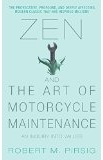Zen 2
Nor is the book about Zen Buddhism, it is ZAMM not ZBAMM. I have absolutely no knowledge or authority to discuss this, it is not from Pirsig. But I think the word Buddhism is very cogent here. I want to say Buddhism has been completely messed up by all the intellectuals but that would be so arrogant – this is the best compromise way of saying it. How many intelligent and wonderful people work hard at Buddhism, but then look at the confusion. It seems to me if you ask a Christian what Christianity is you will get similar answers yet Christians have fought wars about their faith. Before 9/11 if you had asked Muslims about their faith it would seem that there would be more consensus. The response to 9/11 has created such division and violence that consensus, if it was ever there, has gone. But it seems Buddhism is so divided.
And the cause of that division is intellect, whenever you see deep divisions you can see the work of intellect – the work of that knife. Without intellect there would be unity – well so much more unity. You have three branches – Vajrayana, Mahayana (that includes Zen Buddhism) and Theravada. If you ask what Buddhism means to each of these it seems to me the answer would be different. I have one friend who said to me he didn’t see Buddhism as a nature religion and yet there is(was) a leading Thai Buddhist who described the Buddhist God as nature – idapaccayatta. You have Tibetans dancing around in costumes banging gongs and drums whilst Thais have proliferating events in their wats, it is more like a community centre.
Intellect is the key to understanding all of this, as I said where there is division there is intellect. What I have been calling zen cannot be experienced by the intellect. I am loathe to do this but I am going to quote. Buddhadasa says “Now intuitive insight, or what we call ‘seeing Dhamma’, is not by any means the same thing as rational thinking. One will never come to see Dhamma by means of rational thinking. Intuitive insight can be gained only by means of a true inner realization” [Handbook for Mankind p33], and Dogen says “Consequently, those who sit in meditation will, beyond doubt, drop off body and mind, and cut themselves free from their previous confused and defiling thoughts and opinions in order to personally realize what the innate Dharma of the Buddha is”[Shobogenzo p35]. I am sure there are many more examples throughout the suttas/sutras, they can’t even agree on the word – one has to use Pali, one Sanskrit. History has made the credulity of what the Buddha said difficult. There are no verbatim recordings or transcriptions. Some claim various texts are exact because of aural transmission yet I believe it is at least 50 years after the death of Gautama that these transmissions were first written down. Theravada holds these first as sacrosanct - as the word of the Buddha - Tipitaka. Mahayana uses different suttras (my word) that one monk describes as important, not "original" but some kind of collatedness. Then there are all the commentaries and commentators. Books about suttras, books about the books. Now blogs about them all. Message boards, online groups, armchair discussions, moments of zen. Just endless, endless, endless proliferations – sankhara. Arguments abound concerning what is and what isn’t, and these endless proliferations create the divisions.
Where do these divisions come from? Throughout Buddhism (ism is a clue) people are holding to ideas. This is the idea set I hold to, it is different to yours, yours is wrong. In Buddhism there could be unity, Buddhadasa said all Buddhisms were “removing the I and mine from the 5 khandas”. Whatever this means to you, finding zen by letting the mind and body fall away, there is unity in it because it is working towards one thing that is the same throughout Buddhism – whatever words and ideas get in the way.
So the book is ZAMM not ZBAMM, maybe?





